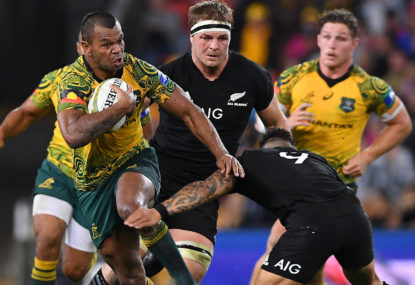JackJumpers' NBL title was special - but where does it sit among Tasmania’s top ten sporting moments?
It’s a pretty good time to be a Tasmanian sports fan right now. After years in the sporting wilderness with not much to celebrate,…

In early 2000 I migrated to Australia determined to give my young family a better life. What struck me about our newly adopted country was the sheer numbers of kids playing sport and, coming from the UK, I’d never seen anything to compare.
At that moment I understood why Australia seemed to enjoy such sporting dominance.
Nearly 20 years later and Australia seems to have lost its mojo. The dominance once enjoyed at the Olympics, in tennis, rugby union and cricket, to name but a few, has receded. This got me thinking about what has changed.
Much is made of the lack of funding to grassroots community sport, but who is to blame for this? Let me be clear that the responsibility lies in one place: the federal Treasury. Here’s why.
Australians are a charitable lot. In 2012 a quarter of us donated over $2 billion to charity, averaging nearly $500 per donation, supporting a range of valuable causes at an estimated cost to the Australian Tax Office of over $1 billion.

(AAP Image/Dave Hunt)
Recently I came across an article from two distinguished barristers, Jennifer Batrouney, QC, and Angela Lee of the Victorian Bar Association entitled Sports – why are they not charitable?.
Batrouney and Lee note that “… obesity is a major public health issue, with nearly two in three adults and one in four children in Australia considered overweight or obese.”
As far back as 1991 research noted as many as 13,000 deaths a year from physical inactivity. The financial impact of lifestyle disease was put at nearly $4 billion a year.
According to the consultancy firm PwC in a report entitled Weighing the Cost of Obesity: A Case for Action, the economic cost estimates have risen to over $8 billion a year – that’s $4,000 for every man, woman and child in Australia arising from a lifestyle dependent and avoidable disease and more than double the 1991 estimate.
The worrying trend is that the children of obese adults are more likely to become obese themselves and remain so into adulthood. Breaking the cycle becomes ever more difficult with every generation.

(AP Photo/Themba Hadebe)
In 2012 the Not-for-profit Sector Tax Concession Working Group received submissions from a wide spectrum of the community, and a consortium of Queensland clubs led by the Ipswich Jets contended that, “Sporting clubs provide an essential contribution to public health by promoting engagement in physical exercise … studies also show that physical activity lowers levels of depression and other debilitative [sic] illnesses.
“For these reasons … the 2001 Charities Definition Inquiry recommended ‘… the encouragement of sport and recreation to advance health, education, social and community welfare … be a charitable purpose’.”
This brings me back to Batrouney and Lee. There is a distinction in Australian tax law dating back to 1895 whereby sport and recreation clubs are not considered charitable. Crucially they are not recognised as deductible gift recipients, therefore any person donating to a sporting club in Australia cannot claim a legitimate deduction against their tax. This distinction discourages altruistic support of sport in Australia.
Three years ago as part of an effort to raise the standard of fitness and play, an acquaintance of mine donated $15,000 to his adult son’s rugby club to refit their gym. He didn’t enjoy any tax breaks for this generous act as the gift was simply not tax deductible. He went ahead anyway, but many people would be discouraged to give even a fraction of this sum in similar circumstances.

(Quinn Rooney/Getty Images)
In Canada parents can claim a deduction of up to $500 per child annually against the cost of sports equipment within their tax returns. As recently as 2002 the United Kingdom changed their tax law awarding amateur sports clubs charitable status, and New Zealand clubs have long enjoyed such an arrangement. Yet Australia continues to lag, tied to a High Court ruling from the 19th century.
If the federal government were to amend tax law and grant deductible gift recipient status to sport clubs whose sporting activity conveyed appropriate levels of cardiovascular benefit, companies and individuals could claim a tax deduction for philanthropic donations. As evidenced from the UK, New Zealand and Canada, donations to support community sport generally increase when they are tax deductible.
Consider a ten per cent increase in charitable contributions from current levels would lead to a loss of revenue to the ATO of perhaps $100 million while at the same time injecting up to $300 million into grassroots sports clubs. This need contribute only a 12 per cent reduction in costs attributed to lifestyle diseases such as obesity to return over $1 billion to the country’s bottom line.
[latest_videos_strip]
Such a change would place more power for fundraising in the hands of the sporting communities. No longer solely dependent upon sausage sizzles, bar sales and the inadequate trickle down of funding from governing bodies, clubs would have the opportunity to exploit an additional angle of fundraising.
The upside for sport in Australia? More investment in grassroots sport, which would lead to more top-flight prospects being uncovered and greater success in all sporting fields.
The financial and health benefits arising from better funding for community sport is clear and has been long understood by federal government. So why will our politicians not act? Do they hold the health and wellbeing of Australians in such contempt?
Ironically our federal masters are among the first to celebrate success on the world sporting stage, so perhaps its time they were prevailed upon to adjust tax law to match that of our nearest sporting rivals. I believe this would be an important step for the lucky country to recover its sporting dominance and, who knows, in time we might even reclaim the Bledisloe Cup!